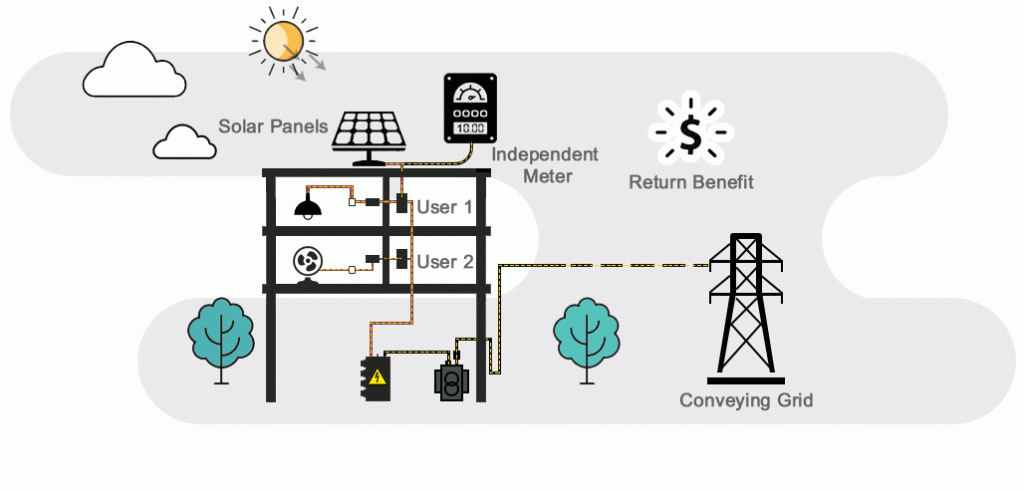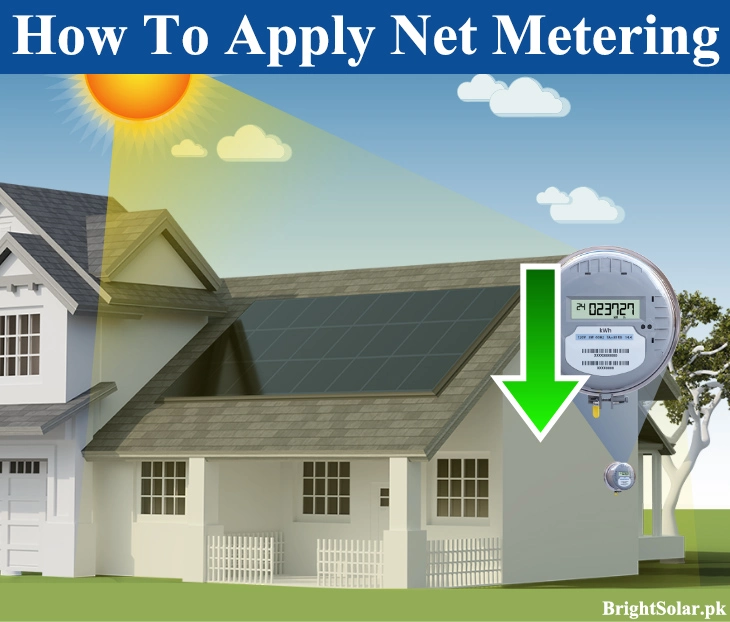Last updated on January 5th, 2025 at 03:18 pm
Understanding Net Metering
Net metering is a beneficial arrangement for individuals with solar panels, allowing them to contribute excess electricity to the grid and receive credits on their electric bills. Here’s how it works:
- Electricity Transfer:
- When your solar panels generate more electricity than you consume, the surplus power is sent back to the grid.
- Monthly Calculation:
- At the end of each month, the utility company calculates the difference between the electricity you generated and the electricity you used.
- Billing and Credits:
- You are billed only for the net amount of electricity you used. Credits are provided for the excess electricity you contribute to the grid.
Benefits:
- Cost Savings: Net metering can significantly reduce your electricity bills, especially during months when your solar panels generate more power than needed.
- Environmental Impact: By contributing clean energy to the grid, you actively participate in reducing environmental impact and promoting sustainability.
- Financial Incentives: Earn credits for the surplus energy you generate, providing a financial incentive for investing in solar energy.

Step By Step Guide To Apply For Net Metering In Pakistan 2025
Net Metering, introduced by NEPRA in 2015, is a groundbreaking initiative empowering individuals to seamlessly export excess electricity to the national grid. Here’s a step-by-step guide to the net metering application process in Pakistan:
Install Solar System:
Before initiating the application for net metering in Pakistan, it is essential to have a solar system installed at your residence, either on-grid or hybrid, with a three-phase meter connection. The solar panels must be strategically placed on your rooftop to maximize sunlight exposure. Collaborating with a registered solar company recognized by AEDB, as a working solar PV system is a prerequisite for utilizing the net metering facility to export excess electricity to the national grid.
Choose a Registered Solar Company:
To apply for net metering, connect with a solar company registered with AEDB (Alternative Energy Development Board). They will guide you through the process. Due to NEPRA regulations, individuals cannot directly apply for net metering. To initiate the process, engage with an authorized solar company, providing them with the responsibility of applying for net metering in Pakistan on your behalf.
Documentation:
Prepare the required documents, including your CNIC, recent Utility bills, and site information. Your chosen solar company will assist in compiling the necessary paperwork.
List of Documents include:
- Completed application form as per Annex-II
- Attested copy of CNIC
- Copy of latest electricity paid bill
- Technical specifications of the inverter
- Technical specifications PV
- Single line diagram
- NOC by Electric Inspector
Application Submission:
Submit your application to the local DISCOM (Distribution Company). This includes the completed application form and all relevant documents. For solar net metering in Pakistan, there are ten DISCOM. Select the one according to your area. Also, go through the net metering rates in Pakistan.
List of electricity distribution companies in Pakistan
- Faisalabad Electric Supply Company (FESCO)
- Gujranwala Electric Power Company (GEPCO)
- Hyderabad Electric Supply Company (HESCO)
- Islamabad Electric Supply Company (IESCO)
- Lahore Electric Supply Company (LESCO)
- Multan Electric Power Company (MEPCO)
- Peshawar Electric Supply Company (PESCO)
- Quetta Electric Supply Company (QESCO)
- Sukkur Electric Power Company (SEPCO)
- Tribal Areas Electricity Supply Company (TESCO)
Technical Inspection:
After receiving your application, DISCOM will conduct a technical inspection of your site. This involves assessing the solar installation and its compatibility with the net metering system. They will issue a No Objection Certificate (NOC) following SRO 892(1)/2015.
Signing of Agreement:
After obtaining a No Objection Certificate (NOC) through SRO 892(1)/2015, consumers sign a three-year agreement with the local electricity provider, like IESCO. This agreement allows the export of surplus solar-generated electricity to the national grid. It streamlines the process of integrating solar energy into the national grid system.
Meter Installation:
After signing the agreement, submit it to NEPRA (National Electric Power Regulatory Authority) for verification, ensuring compliance and obtaining an official generation license. This license, valid for three years, authorizes you as an independent power producer, allowing the contribution of your solar power to the national energy grid. It provides legal recognition and authority for your solar power generation activities.
Connection to the Grid:
Once the meter is installed, your solar system is officially connected to the national grid. You can now begin exporting surplus electricity.
Eligibility Criteria for Net Metering in Pakistan
| Connection Type | Three Phase |
| Consumer Category | Commercial, Domestic, Industrial |
| Solar PV Range | 1KW to10MW |
| Voltage Supply Level | 400V to 11KV |
Summary
For those seeking to benefit from Net Metering in Pakistan, it’s essential to understand the process. Net Metering allows the selling of surplus solar-generated electricity to the national grid, leading to reduced monthly bills. However, direct application is not possible; instead, individuals must engage with an AEDB-registered solar company. This company, like Bright Solar, will handle the application, seeking approval from the Punjab Energy Department and NEPRA. Following approval, an agreement is signed, and the relevant departments issue the NOC and Generation License. With this, consumers gain the authority to generate renewable energy, contributing to the grid and lowering electricity bills. Choosing Bright Solar ensures a smooth and efficient Net Metering application process, thanks to their experience and high success rate.




